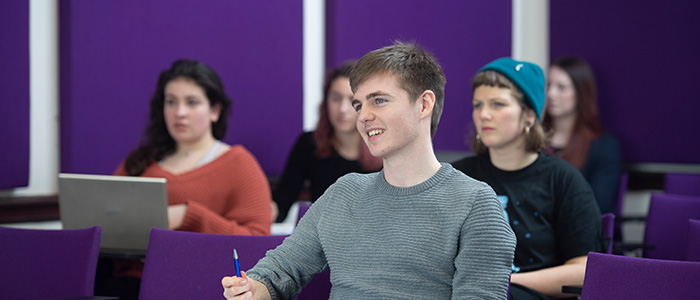Molecular Pathology PhD

Research in pathology is about understanding of disease mechanism. Our history of research and teaching in pathology extends over 200 years and our current Department of Pathology, opened in Queen Elizabeth University Hospital May 2012, is one of the largest in Europe. With £3.4 million of MRC/EPSRC awards for our campus Glasgow Molecular Pathology Node (2015-2019), our aim is to bring the Precision Medicine research into diagnostic practice.
- PhD: 3-4 years full-time; 5 years part-time;
Research projects
+++
FGF signalling in regulation of tumour immune microenvironment
Supervisor: Dr Tomoko Iwata
Research areas: tumour immune microenvironment, growth factor signalling, molecular pathology
Project outline: Immune “cold” tumours are tumours with little infiltrations of T lymphocytes and therefore immune suppressed, developed by a mechanism of evasion from immune surveillance through cancer progression (Hallmarks of Cancer). They pose a challenge for therapy options, particularly for checkpoint inhibitors, which are otherwise promising in many cancer types. Bladder cancer is common, and one of the most highly mutated cancers, similar to lung cancer and melanoma.
While potentially a preferred target of immunotherapy, the response is still limited. Recent molecular classification of muscle-invasive bladder cancer showed that FGFR3 overexpression was frequently observed in luminal-papillary subtype and non-T cell inflamed, immune cold tumours. Studies in our lab showed that activatinf FGFR3 mutation, frequently identified in bladder cancer, suppresses anti-tumour inflammation in the early stage of bladder tumour pathogenesis, thereby increasing overall frequency of tumorigenesis (1, 2). However, the mechanism of immune-suppression by FGFR3 in immune-cold subtype of bladder cancer is still unclear.
Myeloid cells, such as macrophages and neutrophils, could play anti- or pro-tumour roles depending on the stages of tumour progression. We hypothesized that sequence of signalling from myeloid cells to T cells may lead to overall immune suppression of the tumour. While suppression of anti-tumour inflammation may increase tumorigenesis, suppression of pro-tumour neutrophils may allow re-population of T cells in the tumour thereby sensitising tumours to immune checkpoint therapy. Suppression of neutrophils may also inhibit metastasis.
Clinically, FGFR3 is one of the most important therapeutic targets in bladder cancer, and many drugs that target FGF signalling in cancers are already available (3). Therefore, a better understanding of the role of FGF signalling, and that of FGFR3, in regulation of tumour immune microenvironment will provide better opportunities for translation in bladder cancer and others.
Project aims: In this project, the student will investigate the spatial relationship of FGF signalling and myeloid cells in the tumour immune microenvironment in tumour tissues, and evaluate the potentials of targeting FGF signalling and myeloid cells in improving effectiveness of immunotherapy.
Technique used: The student will have opportunities to be trained in a variety of cutting-edge histopathology techniques and technologies, both lab-based and image analysis, including multispectral image analysis, special and quantitative digital pathology, immune and gene profiling, management of tissue resources of model and clinical specimens.
References
- Foth M, Ahmad I, van Rhijn BW, van der Kwast T, Bergman AM, King L, et al. Fibroblast growth factor receptor 3 activation plays a causative role in urothelial cancer pathogenesis in cooperation with Pten loss in mice. J Pathol. 2014;233(2):148-58.
- Foth M, Ismail NFB, Kung JSC, Tomlinson D, Knowles MA, Eriksson P, et al. FGFR3 mutation increases bladder tumourigenesis by suppressing acute inflammation. J Pathol. 2018;246(3):331-43.
- Ahmad I, Iwata T, Leung HY. Mechanisms of FGFR-mediated carcinogenesis. Biochim Biophys Acta. 2012;1823(4):850-60.
Contact address
Dr Tomoko Iwata
School of Medicine, Dentistry and Nursing
Medical Genetics and Pathology, Laboratory Medicine
Queen Elizabeth University Hospital
1345 Govan Road, Glasgow G51 4TF
PI web site: Tomoko Iwata
---
+++
Neutrophils and Chemokine Signalling in the Tumour Immune Micro-environment and Progression
Supervisor: Dr Tomoko Iwata
Checkpoint inhibitor immunotherapy is promising, however still requires an improvement in response and development of markers to predict the patients who would benefit from this therapy.
Neutrophils are abundant blood cell population and known to play anti- or pro-tumour roles depending on the context. Expressed in the neutrophils, a chemokine receptor CXCR2 plays an essential role in their recruitment to inflammatory cites, and its inhibition has been shown to suppress tumorigenesis and metastasis in various cancer types. Furthermore, studies in the pancreatic cancer model have shown that Cxcr2 inhibition resulted in a reduction of pro-tumour neutrophils in tumours, allowing T cells to repopulate, thereby sensitizing them to the checkpoint inhibitor.
In the bladder, an increased expression of CXCR2 ligands is reported to be associated with tumour progression and poor prognosis, however the roles of tumour infiltrating neutrophils remain largely undefined. In order for neutrophils to be targeted in bladder cancer, it is essential to obtain a better understanding of neutrophil biology in the bladder, in comparisons to other tumour types.
The project asks the following questions:
- What are the roles of tumour-infiltrating neutrophils in tumour progression in the bladder?
- What are the characteristics of immune phenotype of neutrophil-enriched tumours, and how do they related to the disease progression?
We will explore the neutrophil-enriched tumour microenvironment by characterizing the topography of immune cell populations and gene expressions in mouse and human tumour tissues.
Aims:
- to establish methodologies in multiplex immunohistochemistry (mIHC) followed by the quantitative pathology imaging (QPI) and evaluate the validity of artificial intelligence (AI) / machine learning-based analytical processes in digital pathology platforms
- to characterise the relationships between tumour infiltrating lymphocytes and Cxcr2+ myeloid cells by topographical analysis
- to identify the critical factors leading to the above immune phenotype by gene expression profiling and analysis at the tissue level.
The overall goal of this study is to understand the roles of neutrophils in bladder cancer progression, and to evaluate the potential of neutrophils or CXCR2 as a new target of immunotherapy.
Techniques: Through this project, the student is expected to gain a significant expertise in tissue-based research based on hands-on experiences in a variety of cutting-edge histopathology technologies, quantitative digital pathology image analysis, immune and gene profiling, management of tissue resources and large-scale data based on model and clinical specimens.
References
- Powles, T., Immune Checkpoint Inhibitors for Urologic Cancer: The Tip of the Iceberg? Eur Urol, 2015. 68(2): p. 280-2.
- Coffelt, S.B., M.D. Wellenstein, and K.E. de Visser, Neutrophils in cancer: neutral no more. Nat Rev Cancer, 2016. 16(7): p. 431-46.
- Jamieson, T., et al., Inhibition of CXCR2 profoundly suppresses inflammation-driven and spontaneous tumorigenesis. J Clin Invest, 2012. 122(9): p. 3127-44.
- Steele, C.W., et al., CXCR2 Inhibition Profoundly Suppresses Metastases and Augments Immunotherapy in Pancreatic Ductal Adenocarcinoma. Cancer Cell, 2016. 29(6): p. 832-845.
- Foth, M., et al., Fibroblast growth factor receptor 3 activation plays a causative role in urothelial cancer pathogenesis in cooperation with Pten loss in mice. J Pathol, 2014. 233(2): p. 148-58.
- Foth, M., et al., FGFR3 mutation increases bladder tumourigenesis by suppressing acute inflammation. J Pathol, 2018. 246(3): p. 331-343.
- Gartrell, R.D., et al., Quantitative Analysis of Immune Infiltrates in Primary Melanoma. Cancer Immunol Res, 2018. 6(4): p. 481-493.
---
Overview
Our concept of Molecular Pathology research stems in the tissue-based investigations that provide the important bases for Precision Medicine. Understanding the disease mechanism helps development of new therapies. Therapy stratification could be enhanced by better prediction of therapy response by molecular, and non-invasive, novel biomarkers. The disease area we work on encompasses cancer, inflammation, cardiovascular diseases, and many others. The research projects can address biological questions (basic science) and/or those in alignment with clinical gap of knowledge and diagnostic needs (clinical).
Use of modern technologies by the well-trained, skilled scientists and healthcare practitioners play an important role in delivering Precision Medicine. Our research projects can involve approaches such as:
- histopathology
- multiplex immunofluorescence
- quantitative pathology image analysis
- immune profiling
- digital pathology
- machine learning
- genetics, such as Next Generation exome and genomic sequencing and expression profiling.
Our research groups are located in the University of Glasgow labs within Laboratory Medicine Building, Queen Elisabeth University Hospital campus. Across our clinical and academic staff interests, the opportunities for Molecular Pathology research is offered to both medical and life science students. Our projects benefit from the close working relationship with Glasgow Tissue Research Facility (GTRF) as well as collaborations with the Schools in the College of Medical, Veterinary and Life Sciences.
Our PhD programmes offer training in tissue-based research using modern technologies in the forefront of Molecular Pathology. The project could address important biological questions or clinical needs and may involve use of model and/or clinical specimens, as well as images, numerical and clinical data. Supervisors are clinical and/or non-clinical academics in UofG and NHS, in close collaboration with research institutes and schools of UofG, such as Institute of Cancer Sciences, Infection, Immunity and Inflammation, and Cardiovascular and Medical Sciences.
Study options
PhD
- Duration: 3/4 years full-time; 5 years part-time
Individual research projects are tailored around the expertise of principal investigators.
Entry requirements
A 2.1 Honours degree or equivalent.
English language requirements
For applicants whose first language is not English, the University sets a minimum English Language proficiency level.
International English Language Testing System (IELTS) Academic module (not General Training)
- 6.5 with no subtests under 6.0
- Tests must have been taken within 2 years 5 months of start date. Applicants must meet the overall and subtest requirements using a single test.
Common equivalent English language qualifications accepted for entry to this programme:
TOEFL (ibt, my best or athome)
- 79; with Reading 13; Listening 12; Speaking 18;Writing 21
- Tests must have been taken within 2 years 5 months of start date. Applicants must meet the overall and subtest requirements , this includes TOEFL mybest.
Pearsons PTE Academic
- 59 with minimum 59 in all subtests
- Tests must have been taken within 2 years 5 months of start date. Applicants must meet the overall and subtest requirements using a single test.
Cambridge Proficiency in English (CPE) and Cambridge Advanced English (CAE)
- 176 overall, no subtest less than 169
- Tests must have been taken within 2 years 5 months of start date. Applicants must meet the overall and subtest requirements using a single test.
Oxford English Test
- Oxford ELLT 7
- R&L: OIDI level no less than 6 with Reading: 21-24 Listening: 15-17
- W&S: OIDI level no less than 6
Trinity College Tests
Integrated Skills in English II & III & IV: ISEII Distinction with Distinction in all sub-tests.
University of Glasgow Pre-sessional courses
Tests are accepted for 2 years following date of successful completion.
Alternatives to English Language qualification
- Degree from majority-English speaking country (as defined by the UKVI including Canada if taught in English)
- students must have studied for a minimum of 2 years at Undergraduate level, or 9 months at Master's level, and must have complete their degree in that majority-English speaking country and within the last 6 years
- Undergraduate 2+2 degree from majority-English speaking country (as defined by the UKVI including Canada if taught in English)
- students must have completed their final two years study in that majority-English speaking country and within the last 6 years
For international students, the Home Office has confirmed that the University can choose to use these tests to make its own assessment of English language ability for visa applications to degree level programmes. The University is also able to accept UKVI approved Secure English Language Tests (SELT) but we do not require a specific UKVI SELT for degree level programmes. We therefore still accept any of the English tests listed for admission to this programme.
Pre-sessional courses
The University of Glasgow accepts evidence of the required language level from the English for Academic Study Unit Pre-sessional courses. We also consider other BALEAP accredited pre-sessional courses:
Fees and funding
Fees
2024/25
- UK: £4,786
- International & EU: £30,240
Prices are based on the annual fee for full-time study. Fees for part-time study are half the full-time fee.
Irish nationals who are living in the Common Travel Area of the UK, EU nationals with settled or pre-settled status, and Internationals with Indefinite Leave to remain status can also qualify for home fee status.
Alumni discount
We offer a 20% discount to our alumni on all Postgraduate Research and full Postgraduate Taught Masters programmes. This includes University of Glasgow graduates and those who have completed Junior Year Abroad, Exchange programme or International Summer School with us. The discount is applied at registration for students who are not in receipt of another discount or scholarship funded by the University. No additional application is required.
Possible additional fees
- Re-submission by a research student £540
- Submission for a higher degree by published work £1,355
- Submission of thesis after deadline lapsed £350
- Submission by staff in receipt of staff scholarship £790
Depending on the nature of the research project, some students will be expected to pay a bench fee (also known as research support costs) to cover additional costs. The exact amount will be provided in the offer letter.
Funding
The iPhD is not supported by University of Glasgow Scholarship/Funding
Support
The College of Medical, Veterinary and Life Sciences provides a vibrant, supportive and stimulating environment for all our postgraduate students. We aim to provide excellent support for our postgraduates through dedicated postgraduate convenors, highly trained supervisors and pastoral support for each student.
Our overarching aim is to provide a research training environment that includes:
- provision of excellent facilities and cutting edge techniques
- training in essential research and generic skills
- excellence in supervision and mentoring
- interactive discussion groups and seminars
- an atmosphere that fosters critical cultural policy and research analysis
- synergy between research groups and areas
- extensive multidisciplinary and collaborative research
- extensive external collaborations both within and beyond the UK
- a robust generic skills programme including opportunities in social and commercial training
How to apply
Identify potential supervisors
All Postgraduate Research Students are allocated a supervisor who will act as the main source of academic support and research mentoring. You may want to identify a potential supervisor and contact them to discuss your research proposal before you apply. Please note, even if you have spoken to an academic staff member about your proposal you still need to submit an online application form.
You can find relevant academic staff members with our staff research interests search.
Gather your documents
Before applying please make sure you gather the following supporting documentation:
- Final or current degree transcripts including grades (and an official translation, if needed) – scanned copy in colour of the original document.
- Degree certificates (and an official translation, if needed): scanned copy in colour of the original document
- Two references on headed paper and signed by the referee. One must be academic, the other can be academic or professional [except iPhD applicants, where only one academic or professional reference is required]. References may be uploaded as part of the application form or you may enter your referees contact details on the application form. We will then email your referee and notify you when we receive the reference. We can also accept confidential references direct to rio-researchadmissions@glasgow.ac.uk, from the referee’s university or business email account.
- Research proposal, CV, samples of written work as per requirements for each subject area. iPhD applicants do not need to submit any of these as you will start your programme by choosing a masters.
- Completed College of MVLS Postgraduate Research Cover Letter
Contact us
Before you apply
PhD/MSc/MD: email mvls-gradschool@glasgow.ac.uk
iPhD: email mvls-iphd@glasgow.ac.uk
After you have submitted your application
PhD/MSc/MD/iPhD: contact our Admissions team
Any references may be submitted by email to: rio-researchadmissions@glasgow.ac.uk

Our research environment



